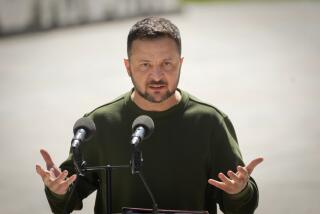Polish Convict Retracts Story of Being Recruited to Kill Walesa
- Share via
WARSAW — A convicted murderer who said he was recruited to kill Solidarity founder Lech Walesa now says he invented the story after watching crime movies.
Jozef Szczepanski, 34, sentenced to jail for 11 years in 1981 for killing an off-duty policeman during a brawl, made the disclosure Thursday night in an interview on state television.
Walesa, interviewed by telephone from his home in Gdansk, said of Szczepanski’s denial, “I would be very happy if it was true, but I have serious doubts about it.” He refused to elaborate.
Szczepanski was detained for investigation after he visited Walesa’s home three weeks ago and told him an unidentified man offered him a gun to shoot the union leader in return for money and a passport.
In the television interview, apparently held in his prison cell, Szczepanski was asked if he made up his original story on the basis of crime movies and detective novels.
‘Above All on Films’
“Yes, on films, above all on films,” he replied.
Szczepanski said in the interview that he had hoped for a full pardon when inventing his story. He said that if he ever met Walesa again, he would tell him, “I’m sorry for all that.”
After the interview, a television announcer said: “So Jozef Szczepanski admitted that the whole story of the Walesa attempt was made up. This is self-evident . . . But not to those who want Poland to be a country in which something is always happening.”
Szczepanski was on compassionate leave from prison because his wife was ill when he visited Walesa.
The government said Szczepanski had a history of mental disturbances and suicide attempts and cautioned against giving credence to his claims.
However, opposition activists have taken threats against themselves seriously since a dissident priest, Jerzy Popieluszko, was kidnaped and murdered by security policemen last October. Popieluszko was an outspoken advocate of the independent labor union Solidarity that Walesa founded but that was subsequently banned by the Communist government.
Walesa’s lawyer, Jacek Taylor, said a mysterious aspect of Szczepanski’s story was his release on parole so soon after he had been convicted of murder. Government spokesman Jerzy Urban said prisoners are often given compassionate leave.
The Warsaw prosecutor’s office said Szczepanski was still in detention and that his claim of inventing the murder plot would be investigated.
More to Read
Sign up for Essential California
The most important California stories and recommendations in your inbox every morning.
You may occasionally receive promotional content from the Los Angeles Times.












